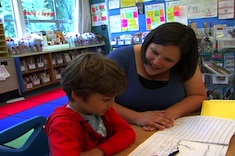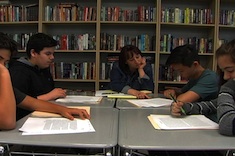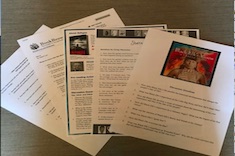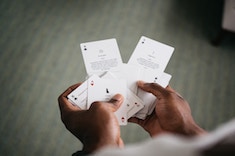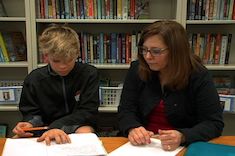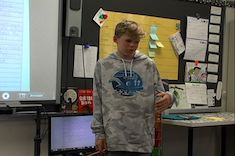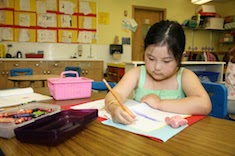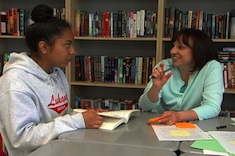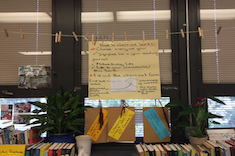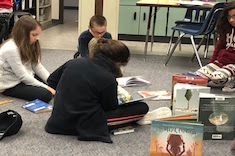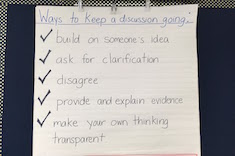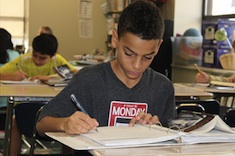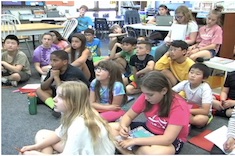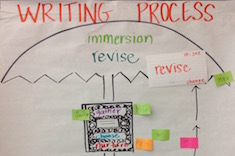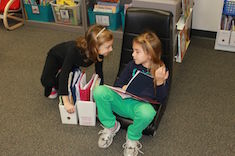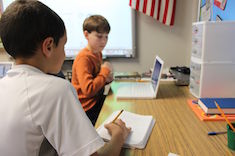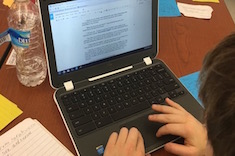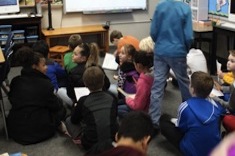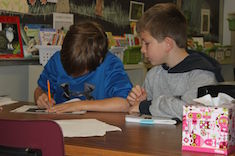Teaching Writing
Everyone who writes for Choice Literacy loves teaching writing, because we all write ourselves. We know it is "hard fun," as Donald Murray famously said—exasperating and exhilarating at the same time. The writing workshops you will read about here and see in our videos are busy, noisy, vibrant places. And most days, we wouldn't want to be anywhere else than in the midst of 'em! Here is where you'll find our latest discoveries, insights, and occasional boneheaded mistakes in teaching writing.
Latest Content
First-Grade Writing Conference: Celebrations to Suggestions
Katrina Edwards begins her conference with first grader Allen by celebrating all he is doing well in his writing. She highlights his language and details in writing before moving on to new strategies to try.
Sharing Writing in a Class Celebration
Do celebrations matter? If you know Ruth Ayres, you know her answer is always a resounding YES. Here are her best tips for sharing writing in a class celebration.
The Power of Similes
If you want stronger poetry from students, a good starting point might be to explore how to write a powerful simile. Gretchen Schroeder explains how she helps her high school students play with and create better similes.
Past Midnight
Shirl McPhillips shares a poem she’s written about her grandmother Eva, and the fragments of memory that inspired it.
Hidden Treasures
Matt Renwick describes the process of paying attention to telling details, and gives practical advice for teaching this skill to young writers.
Being a Teacher Writer Is More Than Being a Teacher Who Writes
Ruth Ayres explains how the distinction between writers and teachers who write is subtle but essential for understanding mentoring in workshops.
Evidence Claims in a Middle School Small Group
Christy Ruth-Levine leads a small group of eighth graders as they explore how to include textual evidence in their literary analysis essays.
Readers’ Guides: Helping Students Think About Informational Text
Suzy Kaback finds the task of creating readers’ guides helps students in the intermediate grades think about evidence in texts in more sophisticated ways.
Teaching Tone: Deal Me In
Gretchen Schroeder’s high school students are surprised to see a deck of cards on their supply list. The cards are a tool for teaching the vocabulary of tone in creative ways.
Planning a Student-Led Minilesson
Franki Sibberson helps Lucas plan his minilesson for his fifth-grade classmates on how to connect words and facts from two different sources.
Student-Led Minilesson: Connecting Facts from Different Sources
Lucas leads a minilesson in Franki Sibberson’s fifth-grade class on connecting facts from different sources.
Does the Pencil Still Have Power?
Ruth Ayres wonders if the pencil still has power, taking readers through a whirlwind history of the writing tool in her life, schools, and the world.
Reader Response as an Entry to Conferring
Christy Rush-Levine integrates reading responses into her preparation for reading conferences, and then uses the responses as a tool to build goals and insights within the conference.
Organizing for Middle School
Tara Smith covers all the basics of how to get organized in middle school for the first days of literacy workshops.
Doing the Writing in a Unit
One way to keep your instruction fresh in a required writing unit is to take on the tasks and topics yourself. Dana Murphy finds completing the assignments herself is well worth her time, and gives her a treasure trove of notebook entries to use in her conferring.
Writing on Someone Else’s Topic
Shari Frost finds she has to do required, on-demand writing for a new job, and in the process develops a new appreciation for how teachers struggle with rigid reading and writing programs.
And This Makes Me Think
Dana Murphy considers how teachers can make writing workshop routines more cozy and like writing at home.
Invitations vs. Accountability
It’s not an invitation if students are required to accept it. Franki Sibberson explains how engagement depends upon true choice and lots of options in her fifth-grade classroom.
Getting to the Heart of Theme
Tara Smith shares many strategies for helping her sixth graders get to the heart of understanding themes in literature.
Writing Routines: Drafting Autonomy
Justin Stygles questions his conferring routine during writing workshops, and the value of interrupting students early in the drafting process.
Conference Records That Stay with Kids
Ruth Ayres explains why conferring records that stay with kids are useful for teachers.
Content and Context
Melanie Meehan considers content and context for students who struggle to master new skills because of a lack of background knowledge.
Leads Minilesson
This fifth-grade minilesson from Franki Sibberson is a lovely mix of mentor texts, Franki's own writing, and honesty about the writing process.
Independent Project Hiccups
Tara Barnett and Kate Mills conclude their series on independent projects with advice on how to handle issues that often crop up as students design and work through writing their projects.
Improving Turn-and-Talks
Melanie Meehan shares questions and reflection prompts to make the turn-and-talk strategy more effective.
Using Tech to Find Authentic Audiences for Student Writing
Matt Renwick discovers technology provides many authentic audiences for student writing.
Managing Independent Projects
Tara Barnett and Kate Mills continue their series on independent projects with nuts and bolts advice on management.
A Variety of Share Sessions
Ruth Ayres catalogs her favorite types of share sessions (from old favorites to creative innovations) in writing workshops.
Backward Chaining
How do you help students who are far behind their classmates in tackling writing projects, and have had years of learned helplessness in approaching complex tasks? Melanie Meehan takes on the challenge with a backward-chaining model.
The Writing Workout
Suzy Kaback meets with a group of teachers to talk through struggles in the writing workshops. Using a fitness analogy, they come up with strategies to try immediately in their classrooms.
Browse Content By
Type
Category
- Assessment Tools
- Big Fresh Archives
- Booklists
- Choice Numeracy
- Classroom Design
- Common Core
- Community Building
- Conferring
- Content Literacy
- Digital Literacy
- English Language Learners
- Equity
- Family Relations
- Free Samples
- Guiding Groups
- Leadership
- Literacy Coaches
- Mentor Texts
- Minilessons
- New Teacher Mentors
- Podcasts
- Poetry
- Quote Collections
- Reading Strategies
- Self Care
- Struggling and Striving Learners
- Talking and Listening
- Teacher Study Groups
- Teaching Reading
- Teaching Writing
- Word Study and Vocabulary
Author
- Melissa Quimby
- Nawal Qarooni
- Gwen Blumberg
- Julie Cox
- The Lead Learners
- Hannah Tills
- Josie Stewart
- Ruth Metcalfe
- Mallory Messenger
- Becca Burk
- Jodie Bailey
- Vivian Chen
- Mary Brower
- Tiffany Abbott Fuller
- Stephanie Affinito
- Ruth Ayres
- Leigh Anne Eck
- Heather Fisher
- Shari Frost
- Julie Johnson
- Suzy Kaback
- Gigi McAllister
- Shirl McPhillips
- Melanie Meehan
- Cathy Mere
- Debbie Miller
- Tara Barnett and Kate Mills
- Tammy Mulligan
- Dana Murphy
- Bitsy Parks
- David Pittman
- Brenda Power
- Heather Rader
- Matt Renwick
- Mandy Robek
- Christy Rush-Levine
- Gretchen Schroeder
- Jen Schwanke
- Brian Sepe
- Katherine Sokolowski
- Stella Villalba
- Jennifer Vincent
Grade Level
Choice Literacy Membership
Articles
Get full access to all Choice Literacy article content
Videos
Get full access to all Choice Literacy video content
Courses
Access Choice Literacy course curriculum and training

